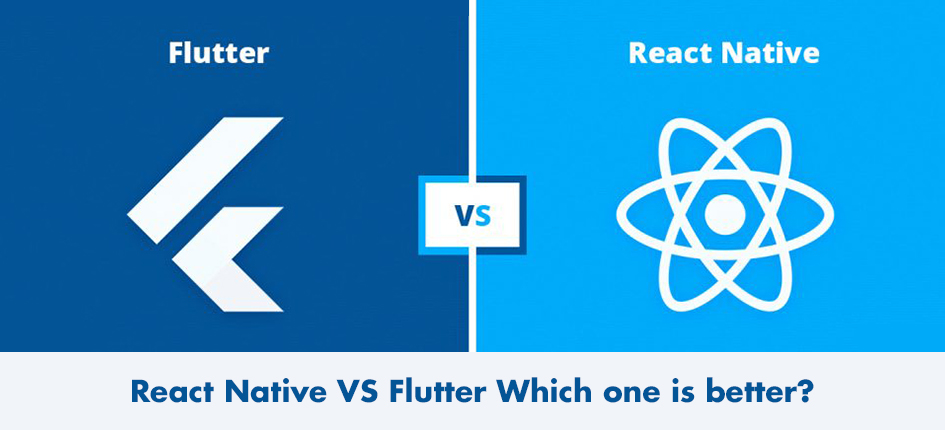React Native vs Flutter – Which one is better?

With the mainstream adoption of modernized technology, the demand for mobile applications has reached an unprecedented level. To suffice the increasing needs for the customers and businesses, a consistent inflow of niche technology, platforms, and frameworks has become indispensable.
For developing a high-performance app for budding businesses, mobile app developers require a robust technology that makes time-consuming coding simple as well as efficient. Thus, most of them are turning to cross-platform app frameworks as they are sought-after in today’s mobile app development market.
Nowadays, React Native and Flutter are deemed two significant frameworks that have been neck and neck for proving their worth. The comparison between these two development frameworks has been a hot topic for the past two years. So, we are going to share our perspective on these frameworks in this article.
Let’s have a quick comparison to decide what to choose in 2020
Facebook launched React Native as a hybrid framework in 2015, which gained a rapid momentum due to its benefits. Experts believe that React Native is the future of hybrid applications.
On the contrary, Flutter introduced by Google is a newbie in the market, which helps mobile app developers in creating intuitive native-like, cross-platform apps quickly.
Below, we have shed light on performance-based comparisons of these frameworks, done on the basis of various factors.
User Interface
When it comes to an app’s user interface and creating the block component, you will witness a considerable gap between Flutter and React Native. While React Native is based on native components, Flutter operates flawlessly with the proprietary widget sets. These widgets are considered the best for creating a customized UI design that also provides dynamism as well as native support.
However, proprietary widgets have a few drawbacks due to which the app lacks a few components, resulting in compromising the user experience. Thus, React Native wins the credit for being the most dynamic framework that improves the user experience of the apps.
Development Time
React Native has become one of the most reliable frameworks for building high-quality, next-gen applications. Mobile app developers prefer this framework because of its efficiency and reduced development time frame. Also, most people hire React Native app developers to give a mobile presence to their businesses and stay ahead of the competition. The ready-to-use React Native components facilitate and expedite the app development process.
On the other hand, Flutter takes more time in app development. Though this framework promises high-quality usability, it demands more recognition as compared to React Native.
Performance
The performance mapping of React Native and Flutter is the best way to figure the ideal mobile app development framework. Dart frame is deemed the key reason why these frameworks have surpassed the other frameworks. Furthermore, the JavaScript layer helps them in connecting with native components seamlessly.
React Native has a broader community as React Native app developers don’t have to face challenges while creating a hybrid app in a native environment using this framework. However, they sometimes witness issues while running a React Native app architecture.
On the other hand, Flutter makes it extremely easy as developers can reuse the existing codes. The C++ engine works perfectly and supports the language. Thus, Flutter steals the thunder here.
Stability
Stability is one of the key factors for a Flutter and React Native app development company to create a frictionless mobile app. The competition between React Native and Flutter is quite tough. In 2017, the Alpha version of the latter framework had left it one step behind as it is not ideal for large projects. But, it made a comeback by launching a Beta 2 version, which offers some exceptional features for mobile app developers.
In contrast, React Native’s community support, and its consistency has made it a more demanding and reliable framework. While React Native has already made a statement in the industry, Flutter is still striving to make a mark. Thus, React Native has outclassed Flutter without an iota of doubt.
Customer Base
React Native needs no introduction as it was and is the best mobile app development framework so far. This framework is perfect for every kind of project as apps like Instagram, Skype, Facebook, Airbnb, as well as Walmart have been developed using this technology.
In contrast, Flutter that came into existence a few years ago is still struggling to match with the benefits offered by React Native. Due to its inception after React Native, it will take more time to gain popularity and acquire a large community.
Documentation & Toolkit
Documentation is a complicated and time-consuming process. Flutter facilitates this process and makes it easier for developers to document the applications. Thus, as far as documentation is considered, this framework is way better than that of React Native.
On the other hand, the documentation process with React Native is not so organized. This framework deletes the components that streamline this process.
Besides, the tools bring forth a fierce competition between these two frameworks. Flutter possesses a wide array of IDEs as well as tools with React Native support. Also, this framework is highly compatible with the Visual Studio Code and Android Studio. Therefore, Flutter is a clear-cut winner in this aspect.
Takeaway
So, this is a detailed list of the comparisons between React Native and Flutter that are sought-after among startups as well as well-established businesses. Both of these frameworks have their own benefits in terms of performance, stability, documentation, and community.
Thus, it is kinda hard to decide which one is better as both come with their own pros and cons. But we can say that Flutter will take more time to gain stability in the industry as this is a relatively new framework. This concludes that React Native is a smart choice for hybrid app development.

